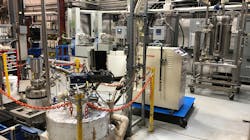New sewage treatment step improves biogas conversion
An extra step to sewage treatment could improve the anaerobic conversion of sewage sludge to biogas, according to a press release by Washington State University’s Tina Hilding.
Reporting in the journal, Waste Management, a Washington State University research team tested a sewage pretreatment technology, adding an extra step to typical treatments and using oxygen-containing high pressure steam to break down sewage sludge.
Adding the new pretreatment step could improve the anaerobic conversion of sewage sludge at the wastewater treatment facility, which has a less-than-50 percent conversion rate under current practices. The team found that they were able to convert more than 85 percent of the organic material to biogas, producing 98 percent more methane overall compared to current practices.
“It was shown to be extremely efficient, and that’s very exciting,” says Birgitte Ahring, professor in the Gene and Linda Voiland School of Chemical Engineering and Bioengineering, who led the work. “This can be applicable and something we could begin to explore in Washington state. Not wasting waste but using its potential instead has major advantages.”
For their study, the WSU research team treated the sludge at high temperature and pressure with oxygen added before the anaerobic digestion process. The small amount of oxygen under the high-pressure conditions acts as a catalyst breaks down the polymers in the material.
The WSU researchers have been studying this pretreatment process for several years, using it to break down straw and woody materials. They weren’t sure the process would work with the different composition of sewage sludge, such as lipids and proteins, but were positively surprised.
“This is not a very high-tech solution,” Ahring says. “It’s actually a solution that can be useful even at small scale. The efficiency has to be high or else you cannot warrant adding the extra costs to the process.”
The technology could be particularly helpful for smaller communities, many of which are motivated to reduce waste and their climate impact, she added.
The researchers are now scaling up the work in their pilot facility located at WSU Tri-cities to further demonstrate the process. They are also studying how to efficiently convert the biogas to more valuable renewable natural gas by a new bioprocess.
